Many people dream of traveling the world, but worry about the cost. However, it’s possible to explore new places without spending a lot of money. This guide is full of tips for budget travel that can make your vacation affordable. Whether you’ve traveled a lot or are planning your first trip, these tips can help. They’ll show you how to save money and still have an amazing journey.
With these budget travel tips, you can see beautiful places without draining your bank account. You’ll learn to enjoy the wonders of the world and rich cultures on a budget. Start your journey with the knowledge that you’re traveling smart and saving money. It’s about valuing experiences over the amount of money spent. Each step you take can be filled with joy, all while being kind to your wallet.

Key Takeaways
- Implement frugal travel advice to make worldwide exploration a reality, regardless of budget constraints.
- Adopt money-saving travel tips and budget-friendly travel hacks to maximize your travel experience while minimizing costs.
- Learn how affordable vacation strategies can enrich your journey without emptying your savings.
- Discover the potency of low-cost travel tips that help you see more for less, proving that economical travel is both attainable and enjoyable.
- Unveil the art of travel on a budget, allowing you to create priceless memories without a hefty price tag.
The Essentials of Planning for Budget Travel
For a great budget travel planning, careful preparation is key. Before travelling, it’s important to know your budget inside and out. This helps balance your dreams and your money, allowing you to fully enjoy your trip.
Setting Financial Expectations
Dealing with money is as important as making your travel plan. Starting with setting financial expectations helps a lot. It reminds you to think about not just flights and hotels but also daily costs like food, local travel, and entry tickets.
Utilizing Budgeting Tools and Resources
Luckily, today’s technology offers many budgeting tools and budgeting resources. A key tool is the travel budget calculator, perfect for estimating costs. Budget apps also help manage spending, ensuring you stay on track financially.
- Travel Budget Calculator: Use it to break down your expenses by category and monitor your budget allocation.
- Budgeting Apps: They can help you track daily spending, split costs with travel companions, and even find local deals.
Using these tools keeps finances under control and reduces worry about money. This lets you fully enjoy your adventure.
Smart Flight Strategies for Economic Travel
Finding affordable flights is often the hardest part of planning a low-cost trip. But, with the right know-how, getting cheap flights is totally possible. Here, we’ll go over some budget flight strategies to make your next journey less pricey.
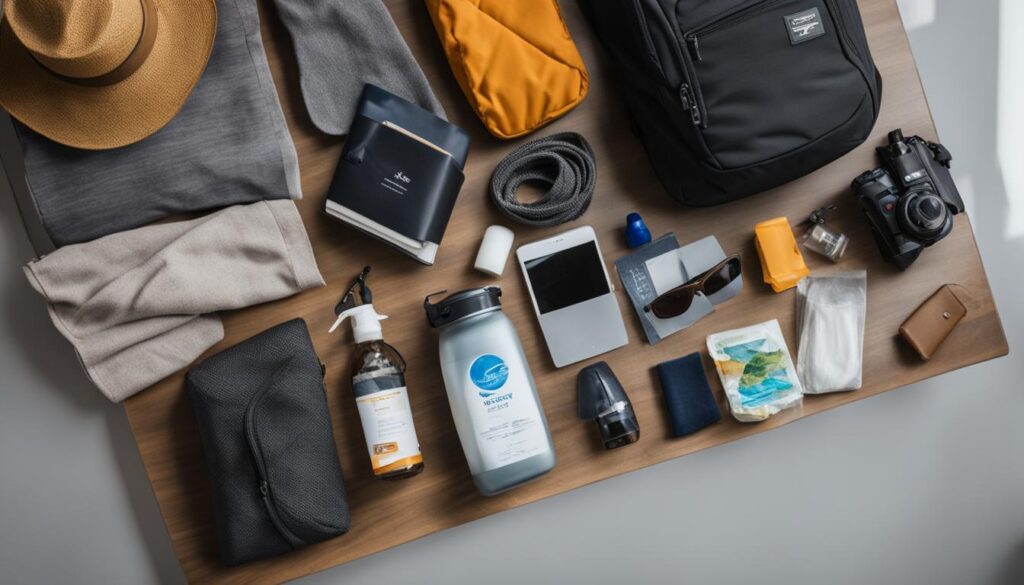
Fare Comparison and Alerts
At the heart of cheap travel is fare comparison. Thanks to many online sites, you can easily see prices from various airlines. This search helps you find the best cheap flights and learn about price trends.
Setting up flight alerts is also key. These alerts inform you about price changes and deals. This way, you can snag discounts right when they pop up.
Opting for Off-Peak Travel
Picking the right time to fly can save you a lot of money. Flying during off-peak travel times, like midweek or shoulder season, makes flights cheaper. Plus, your destination will be less crowded, making your stay more enjoyable.
Using smart tips like alerts and smart timing lets you spend more on fun activities at your destination.
Accommodation Hacks for Frugal Travelers
Finding budget accommodation when you travel is easy. There are many ways to find frugal lodging options that are both comfortable and well-located. By choosing alternative lodging and learning how to negotiate rates for long-term stays, your budget can last longer. Let’s look at some great strategies.
Embracing Alternative Lodging Options
Look beyond the usual hotel offers for affordable lodging. Hostels are great for those looking to save and meet people. Guesthouses and B&Bs offer a homey feel and personal touches. To truly experience local culture, try a homestay instead of a hotel.

Long-Term Stays and Negotiating Rates
If you’re staying in one place for a while, ask about discounts for longer stays. Be bold and negotiate the rate. This benefits both you and your host by providing them steady income and giving you a better deal.
| Type of Lodging | Typical Perks | Ideal for Traveler Type | Expected Savings |
|---|---|---|---|
| Hostel | Communal areas, events, kitchen facilities | Solo and social travelers | Up to 50% less than hotels* |
| Guesthouse | Homely vibe, local tips from hosts | Couple or small groups seeking quiet | 20-30% less than hotels* |
| Homestay | Local culture, home-cooked meals | Cultural enthusiasts, language learners | Varies, often with meals included |
| Long-term Rental | Stability, potential to feel ‘at home’ | Remote workers, long-term travelers | Significant when negotiated |
Note: Savings are approximate and dependent on location and seasonality.
Using these accommodation hacks, you can have great experiences without overspending. These options can lead to big savings. This means you can travel more and see more of the world.
Local Transits: Navigating Cities Affordably
When visiting a new city, choosing local transportation shapes your expenses and experiences. Taxis and ride-sharing might look tempting but can be pricey. Meanwhile, public transportation like buses, trams, and subways saves money and offers a peek into local life.
Using the city’s affordable city transit is smart for budget-watchers. These systems are designed for easy and efficient travel. They get you from point A to point B cheaply. By choosing a metro or bus, you also support sustainable practices helping both the planet and your wallet.
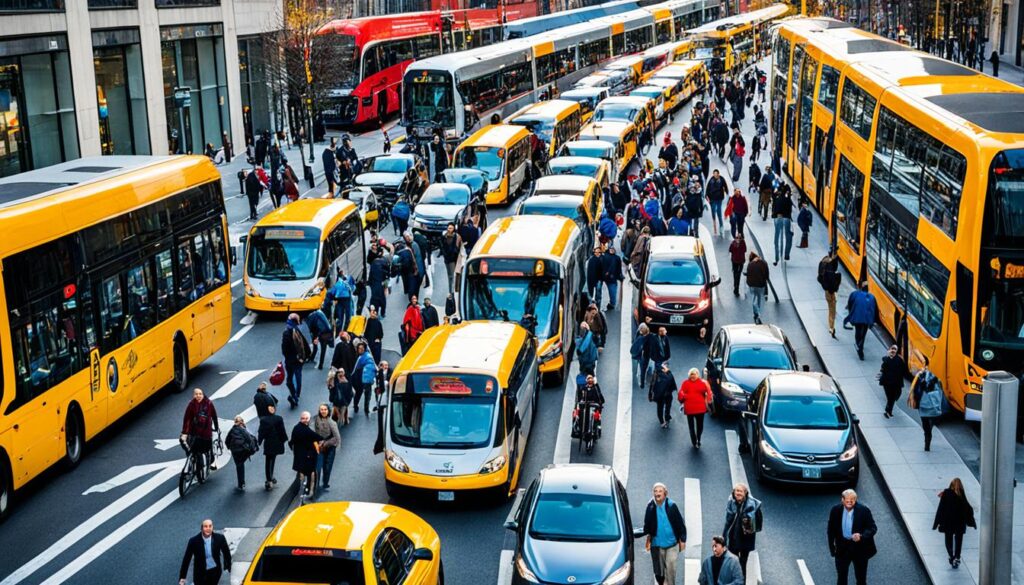
Below, find a guide to different budget-friendly transportation options in major cities. This guide helps estimate costs and plan your travels more effectively.
| City | Transportation Mode | Cost | Advantages |
|---|---|---|---|
| New York | Subway | $2.75 per ride | Extensive network, frequent service |
| Chicago | CTA Buses and Trains | $2.50 for buses, $2.25 for trains | Convenient, connects major areas |
| San Francisco | MUNI buses, trains, & cable cars | $3 per ride, $94 monthly pass | Includes historic cable cars |
| Boston | MBTA Subway | $2.40 per ride | Accessibility, reliability |
| Washington D.C. | Metrobus and Metrorail | Varies per distance | Wide reach, SmarTrip card convenience |
Understanding how to buy tickets is key in public transit. This could mean single rides or passes that save money. Mobile apps are great for updates, planning, and payments. They help you skip lines and map out your trip smoothly.
Also, asking locals or transit experts for help is a good idea. They can reveal shortcuts and
budget-friendly transportation options
you might not find on your own. Using public transport not only saves you money. It also lets you see parts of daily life you’d miss in a car.
Utilizing Sharing Economy Services
The sharing economy services have changed travel. They help us connect with new places and people in better ways. These options are cheaper, making travel not just better but also easier on the wallet. We will look at how to use sharing economy in your travels, including hitchhiking tips.
Utilizing Sharing Economy Services
Sharing economy services do more than save money. They let you really experience local cultures and connect with people. You can avoid expensive taxis with ridesharing apps or stay in places that feel more like home through certain platforms. These choices cut down on costs and offer genuine experiences.

Mastering the Art of Hitchhiking
Hitchhiking is not just a thing of the past. It’s still a great way to travel without spending much. To do it right, you should be ready and always think about safety. Here are some important tips for those wanting to hitchhike:
- Find out about hitchhiking rules and culture to be respectful and legal.
- Pick places to hitchhike where you’re safe, like service areas, away from fast cars.
- Wear bright or reflective clothes and have a sign showing where you’re going.
- Stay hopeful and patient. Hitchhiking can be challenging, but it’s also rewarding.
| Sharing Economy Service | Advantages | Considerations |
|---|---|---|
| Ridesharing Platforms | Cost-effective, convenient, and offers a chance to meet locals | May vary in availability depending on region |
| Accommodation Sharing | Affordable, authentic living experiences | Must vet hosts and locations for safety and quality |
| Meal-Sharing Services | Dine with locals for less; discover home-cooked meals | Consider dietary restrictions and allergies |
Feasting on a Budget: Save on Food While Traveling
Traveling opens up chances to try new foods. But eating out often can hurt your budget. Luckily, you can enjoy budget dining by making smart choices. We’ll show you some tasty, affordable food options to enjoy local tastes without spending too much.
Shopping at Local Markets
Exploring local markets is an exciting adventure. Here, travelers find fresh, affordable food. You can choose ripe fruits for a picnic, or buy local cheeses and artisan bread for a feast in your room. These markets provide cheap ingredients for dining cheaply.
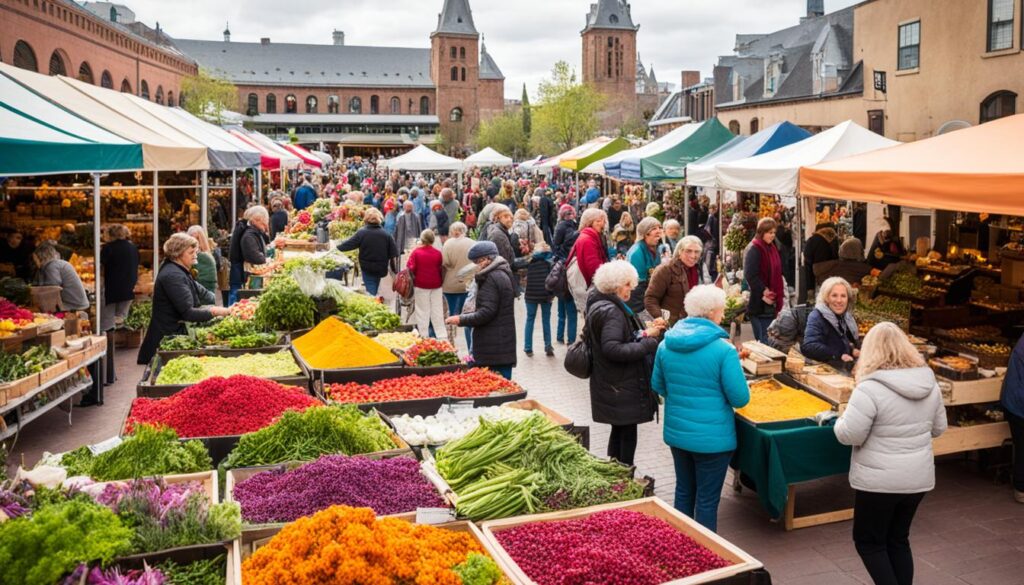
Eating like a local means knowing where to shop and using ingredients wisely. Below is a comparison to show the savings of cooking meals versus eating out:
| Item | Average Market Price | Average Restaurant Price | Estimated Savings |
|---|---|---|---|
| Loaf of Bread | $2 | $5 | $3 |
| Fresh Produce (1 lb) | $1 | $3-4 | $2-3 |
| Local Cheese (1 lb) | $4 | $8 | $4 |
| Cured Meats (1 lb) | $5 | $12 | $7 |
Cooking Your Own Meals
Cooking your own meals while traveling is a great way to save. It’s enjoyable and lets you explore the destination’s food traditions. Hostels and rentals often have kitchens. Here, travelers can make easy yet delicious meals with local ingredients. This saves money and offers a closer look at local life.
For those wanting to save while eating well, here are some simple meal ideas. They’re quick to make and tasty:
- Pasta with local sauces and vegetables
- Garden salads with regional produce
- Sandwiches with local deli meats and cheeses
- Stir-fries with local spices and ingredients
Using these food strategies helps stretch your dollars and enhances your travel. Eating is as much about the experience as the food. By exploring local markets and cooking your own meals, you connect deeply with different cultures. So, eat smart on your next trip, enjoy every bite, and save money.
Free and Low-Cost Entertainment for Travelers
Going on a journey doesn’t have to drain your bank. There are many budget-friendly attractions and experiences for smart travelers. By choosing wisely and knowing where to look, you can enjoy a place’s culture without a big expense.
Utilizing City Tourist Cards
City tourist cards can be a great deal. They offer free or discounted access to major sites, museums, and sometimes even public transport. They help you save money and simplify your sightseeing. It’s an easy and affordable way to experience the best of a city.
“Maximize your exploration, minimize your expenses.”
Engaging in Complimentary Walking Tours
Free walking tours are a gem for exploring a city’s history and culture. Led by passionate guides, they let you dive deep into the city. These tours are a great way to meet others and learn, costing you nothing.
Consider these options to see how tourist cards and free tours are budget-friendly:
| Activity Type | Cost | Experience |
|---|---|---|
| Standard Tourist Attraction Entry | $$ | Self-guided, limited interaction |
| City Tourist Card | $ | Multiple entries, discounts, and ease of use |
| Complimentary Walking Tour | Free | Guided, informative, social engagement |
Adding city tourist cards and free walking tours to your plan is smart. You can admire beautiful landmarks or explore charming areas affordably. These options offer rich experiences without costing a lot.
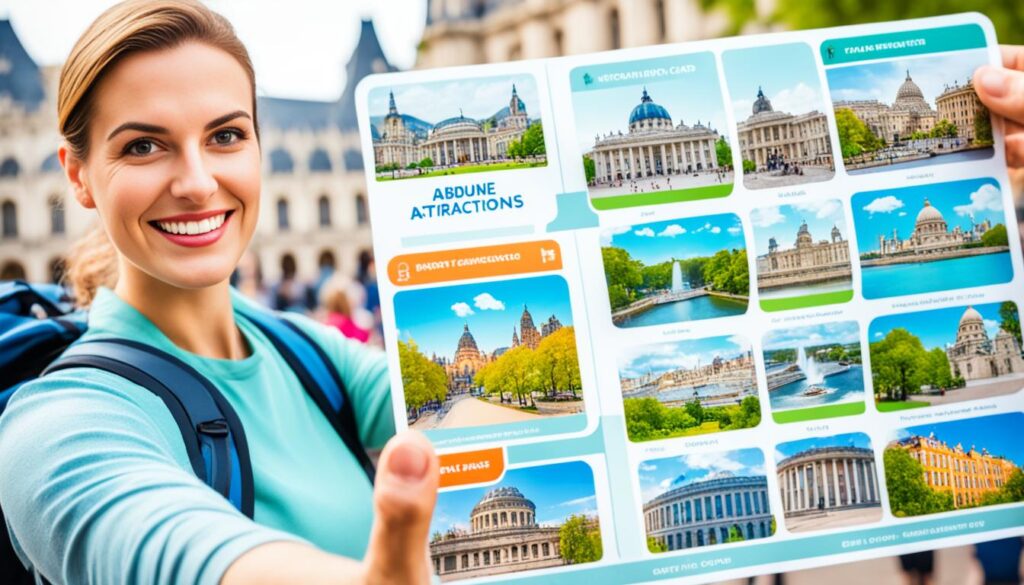
Monetize Your Skills and Talents While Traveling
When wanderlust meets your skill set, the world is not just a playground but also a place to monetize skills while traveling. Thanks to remote work and lots of freelance opportunities while traveling, there are many ways for skilled people to earn. If you are a graphic designer, language teacher, or have another talent, the digital nomad life is perfect for you. Here are tips to earn money and experience overseas.
- Identify skills that are wanted worldwide and can be done remotely
- Use platforms like Upwork or Fiverr for freelance work
- Join digital nomad and expatriate forums and communities
- Consider teaching English or another language, online or abroad
Finding a balance between work and exploring new places needs structure. It’s important to find the right chances to work that match your skills. Here is a table showing platforms where you can get suitable gigs.
| Type of Work | Platform | Benefits |
|---|---|---|
| Freelance Writing/Editing | Upwork, Freelancer | Wide variety of jobs, set your rates |
| Graphic Design | 99Designs, Dribbble | Connect with global clients, showcase portfolio |
| Language Teaching | italki, TEFL | Flexible schedule, cultural exchange |
| Virtual Assistance | Remote.co, Virtual Vocations | Long-term contracts, diverse industries |
| Programming/Development | GitHub Jobs, Stack Overflow | Collaborate on projects, high demand |
Working while you travel boosts your journey and lets you work abroad and live like a local. By diving into different cultures while earning, you can travel more, gain unique experiences, and grow your network worldwide.

“The beauty of the modern world is that your office can be anywhere, and your work can be as boundless as your travels.”
Being able to monetize skills while traveling blends freedom with purpose. With a smart plan, understanding of market needs, and using the right platforms, your career and adventures can grow together. Say yes to freelance opportunities while traveling, and each new place will be both a joy and a chance for professional progress.
Staying Connected: Affordable Communication on the Go
Exploring new places doesn’t mean you’re out of reach. You can stay connected affordably, no matter where you are. Knowing the difference between prepaid SIM cards and global roaming is key. Also, using free Wi-Fi spots helps keep costs low.
Prepaid SIM Cards vs. Global Roaming
Choosing how to stay in touch when abroad is crucial. Prepaid SIM cards offer low-cost calls, texts, and data. They’re perfect for travelers who want to save money.
However, global roaming with your home network is more straightforward but can be costly. Unexpected fees are a common risk.

| Feature | Prepaid SIM Card | Global Roaming |
|---|---|---|
| Cost | More affordable, pay local rates | Can be expensive, with variable roaming charges |
| Accessibility | Easy to purchase upon arrival | Available through your existing provider |
| Convenience | Requires a new local number | Keep your number, seamless service |
| Internet Data | Typically offers generous local data plans | Limited data or high per-MB costs |
Finding Free Wi-Fi Spots
Looking for free Wi-Fi is another way to get online. You can find it in places like cafés and libraries. There are apps to help you find these spots, keeping you connected.
- Seek out coffee shops and eateries with free internet
- Use apps to map out Wi-Fi before your travels
- Look for public spaces like parks and museums that offer free access
Using prepaid SIM cards and finding free Wi-Fi spots can offer the best of both worlds. You save money and stay connected. Following these suggestions, communicating while traveling becomes easy and flexible.
Travel Insurance: An Investment in Peace of Mind
Understanding importance of travel insurance is more than being cautious. It ensures your peace of mind as you travel. With it, you’re covered for flight cancellations, medical emergencies, or unexpected events. This article shows how affordable travel insurance keeps your budget safe. It also gives you peace during your journeys.
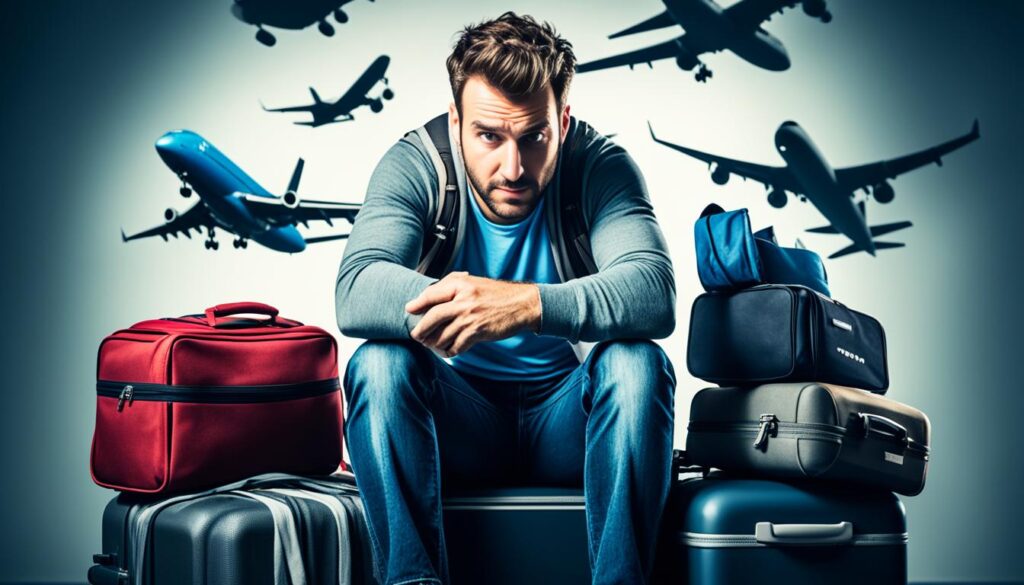
Budget-aware travelers often wonder if travel insurance is worth it. Traveling brings risks, from small annoyances to big emergencies. The importance of travel insurance is clear. It covers trip cancellations, lost belongings, delays, and important medical issues abroad.
When picking a plan, it’s key to know what’s covered and what’s not. Looking closer, budget-friendly travel insurance options meet different needs. They balance cost and coverage well.
Travel insurance is your primary buffer against travel’s unpredictability, acting as a guarantee that unforeseen expenses won’t derail your experience.
To assist you, here’s a simple overview of what travel insurance offers:
| Coverage Option | Benefits Provided | Estimated Cost Range |
|---|---|---|
| Basic Coverage | Trip Cancellation, Travel Delays, Baggage Loss | $50-$100 |
| Comprehensive Coverage | Medical Emergencies, Evacuations, Flight Accidents | $100-$300 |
| Specialized Riders | Adventure Sports, Pre-existing Conditions, Higher Coverage Limits | $50-$200 |
Remember to tailor travel insurance to your trip’s needs, where you’re going, and planned activities. With many budget-friendly travel insurance options out there, finding the right insurance is easy. See it not as an extra cost, but as a smart investment in your travel enjoyment and safety.
Creating Lasting Memories: Budget-Friendly Souvenir Ideas
Souvenirs are special. They remind us of our travels each time we see them. However, the cost of these items can worry travelers. They might skip buying souvenirs to save money. But, there are ways to remember your trips without spending much. You’ll learn about budget-friendly souvenirs here. These are both cheap and meaningful.
Postcards are an easy and cheap way to keep memories. They show beautiful places you visited. Also, buying from local markets is smart. You can find special items and help local workers. These items reflect the culture of the place and are valuable memories.
Being creative can save you money too. You could make a travel scrapbook with things you find. Things like ticket stubs, maps, and coasters can go in it. This makes your memories even more personal. Following these souvenir shopping tips helps you save money. And you still keep wonderful memories of your travels.